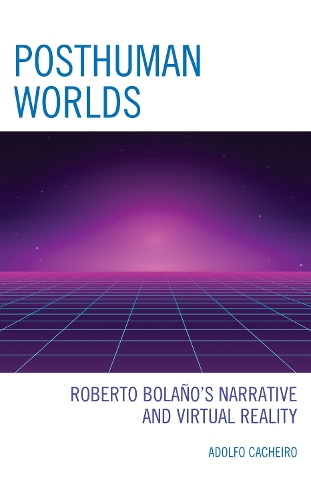
Posthuman Worlds: Roberto Bolao's Narrative and Virtual Reality
(Hardback)
Publishing Details
Posthuman Worlds: Roberto Bolao's Narrative and Virtual Reality
By (Author) Adolfo Cacheiro
Bloomsbury Publishing PLC
Lexington Books
3rd March 2022
United States
Classifications
Professional and Scholarly
Non Fiction
863.64
Physical Properties
Hardback
256
Width 163mm, Height 237mm, Spine 22mm
508g
Description
Posthuman Worlds: Roberto Bolao's Narrative and Virtual Reality presents interpretations of several novels and one short story by Roberto Bolao. As befits the global setting of most of these narratives, they are analyzed from the perspective of global culture and politics. Particular attention is paid to transnational European politics, as this topic is central to an understanding of the intertwined themes of politics and the law in Bolaos work. In Distant Star and Labyrinth, these themes exist within the context of a preoccupation with personal identity and ideology. Adolfo Cacheiro utilizes psychoanalytic interpretation and philosophical exegesis to clarify the subjective component of this preoccupation in the aforementioned texts. The law is also a prominent theme of The Savage Detectives, which Cacheiro interprets in relation to mythology. One of the most innovative aspects of this book is the discussion of the role of virtual reality in Amulet and 2666. These novels are read as representations of a posthuman world that manifest an intertextual relationship with science fiction. In 2666 virtual reality unifies the diverse components of a world system in time and space. A phenomenological investigation of this reality supports the conclusion that the principle subject matter of 2666 is a naturalistic theology based on technology.
Reviews
Cacheiro runs with the sci-fi spirit that haunts Roberto Bolao's 2666, producing a genuinely surprising critical intervention. Equal parts fabulation and analysis, Posthuman Worlds convincingly reads novelistic episodes, both famous and under-examined, as philosophical vignettes. The end result is a tour de force from simulation to revolution.
--Hctor Hoyos, Stanford U., author of Beyond Bolao: The Global Latin American NovelPosthuman Worlds is a daring and refined philosophical theorizing of/on Roberto Bolaos bestsellers. Virtual reality is analyzed as a livable political real to deem "the impact of transnational European politics and ideology" (civilization). Cacheiros imaginative close readings creatively engage with Lacanian psychoanalysis vis--vis Borges s short stories. Through conversations with a diverse range of philosophers and literary critics, the author plots a labyrinthine journey of Bolaos geographical displacements (from Mexico to Chile and, finally, Spain) to provide answers to what kind of world can make a life worth living.
--Ana Del Sarto, The Ohio State UniversityWhereas critics have argued that the leitmotiv connecting Bolao's oeuvre is friendship, violence and evil, marginal, obsessive writers and writing itself, or failure of the revolutionary project of the 1960s and 70s in Latin American, Cacheiro proposes an alternative cornerstone for Bolao's fragmented narrative: he contends that, echoing the author's personal displacement from Latin America to Europe, as his characters travel from Latin America to Europe and vice versa, the Latin America represented in his writing must be understood as contrasted, in a phenomenological divide, with Europe. Applying theories by Lacan, Zizek and Badiou, Posthuman Worlds offers an original and insightful reading of the political message in Bolao's literature, which proposes, as a model for Latin America, the European renewal of the modernist project and of the progressive ideals of social justice that failed in the Americas. Along the way, claims Cacheiro, uncanny forces that cause anxiety to Bolao's characters end up having socioeconomic effects. They feel manipulated by external forces, as if they were posthumans being played as part of the entertainment for the director of a virtual reality computer simulation.
--Ignacio Lpez-Calvo, University of California, MercedAuthor Bio
Adolfo Cacheiro is professor of Spanish at Wayne State College.
